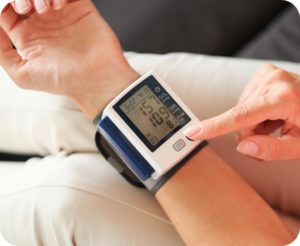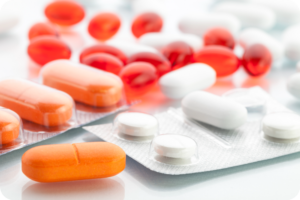Obtaining Preferred Rates for Life Insurance with High Blood Pressure: A Step-by-Step Guide [2024]
Are you struggling to find low cost life insurance coverage due to your high blood pressure? Discover how simple it can be to buy life insurance with high blood pressure and receive preferred rates.
life insurance with high blood pressure and receive preferred rates.
Our carriers understand the importance of proper medical management and offer preferred rates to individuals with controlled blood pressure readings while using prescription medication.
Don’t let your health condition hold you back from protecting your loved ones and securing their financial future. With our expertise, you can navigate the life insurance application process smoothly and ensure you have the coverage you need.
Table of Contents
- The Best Carriers for High Blood Pressure
- Can High Blood Pressure Affect My Rates?
- Best Types of Life Insurance for Hypertension
- No Exam Life Insurance for Hypertension
- Risk Factors for High Blood Pressure
- Can Using Medication Affect My Rates?
- What Are Elevated Pressure Readings?
- Questions the Carriers Will Ask You
- Being Overweight With Hypertension
- How Much Does Life insurance Cost?
- Three Basic Health Classifications
- Using Tobacco & Alcohol Products
- Our Final Thoughts
Best Life Insurance Companies for High Blood Pressure?
Here are some of the best life insurance companies for hypertension, among other medical conditions. Remember that every applicant is different, and the best company for one person may not be the best for another.
We pre-screen our applicants to correctly choose the most applicable company that will offer them the lowest rates. Life insurance is not a one size fits all, form of insurance.
1. Prudential
2. Liberty Financial
3. AIG American General
4. Banner Life
5. Protective Life
6. Transamerica
We work with over 40 companies and know from experience that these six carriers are very applicant-friendly to people with hypertension and offer some of the best rates.
Can High Blood Pressure Affect My Rates?
Having hypertension can affect your rates but if your readings are within safe limits you’re going to qualify for excellent rates as long as you don’t have other medical conditions to be concerned about.
All life insurance companies pay attention to hypertension.
The carriers look for regular blood pressure readings that are stable and do not excessively fluctuate from day to day.
Getting life insurance with controlled hypertension is usually a snap with modern medications, proper diets and eliminating smoking and drinking excessive amounts of alcohol.
When the carrier’s underwriters find that excellent safe blood pressure readings are not apparent, a red flag goes up right away. The higher your blood pressure readings, the higher your rates could become or simply be declined.
Best Life Insurance Policies for People with Hypertension
Term Insurance –
The first type of life insurance for elevated blood pressure is Term Life Insurance plan designs which are the temporary plan designs. These policies cover the insured for a specific time stated in the policy contract.
These term periods usually range from 10-40 years.
An excellent company from Maryland called Banner Life now offers 35-year and 40-year term policies. This works out great for people looking for long-term periods, especially for younger applicants.
Universal Life –
The second type of life insurance would be permanent life insurance plan designs such as universal and whole life. Universal life insurance will last the entire lifetime of the individual covered under the policy.
It costs more than term insurance, but it can be bundled with a term to create an excellent and affordable life insurance portfolio.
Whole life insurance is not cost-effective, and many companies have dropped it from their product lines. A Whole Life policy costs about ten times as much as term plans.
The cash build-up feature is what drives up the cost of the premium. We have found that Protective Life has some of the lowest rates of universal life insurance.
Applying for Life Insurance Without Taking a Medical Exam?
Yes, you sure can, and you have a great choice of companies to choose from too. Many people want to buy life insurance but dread taking a medical exam. Blood tests are usually the part people dislike, preventing people from applying.
If you are one of those people, you can stop worrying now because there is another way. No medical exam life insurance may be just the right plan design for you, and these plans can have approval times of 24-48 hours, which is a fraction of the fully underwritten plans.
You can easily find life insurance that does not require medical records or a physical exam.
What Are the Risk Factors of High Blood Pressure?
The most critical issue of elevated blood pressure is the excessive damage placed on arterial walls caused by hypertension. These elevated pressure readings can and eventually will damage blood vessels and internal organs.
The higher the blood pressure and the longer it goes untreated, is a recipe for life-threatening damage. If elevated blood pressure is left untreated, it can lead to risk factors such as:
Heart Attacks & Strokes –
High blood pressure can thicken and harden the artery walls, leading to fatal heart attacks or massive strokes. This is the main reason that all the best high blood pressure life insurance companies take hypertension seriously.
Dementia –
Narrowing or partially blocking arteries can constrict and significantly limit blood flow to the brain. The result can become a case of dementia leading to a specific type of dementia (vascular dementia).
A stroke interrupts blood flow to the brain and can also cause vascular dementia. A stroke can even cause this form of vascular dementia.
Torn or Narrow Blood Vessels in the Eyes –
If your eye’s blood vessels are affected, it can cause partial or complete vision loss. This is another good reason to maintain controlled hypertension.
Aneurysms –
High blood pressure can cause your blood vessels to weaken and bulge out of shape, forming what is known as an aneurysm. The main problem is if an aneurysm ruptures, it can be fatal. Unfortunately, a person will often hemorrhage to death before they can get to a hospital.
Elevated blood pressure can cause these aneurysms to start and steadily get more intense until they can burst from the steadily rising pressure.
Kidney Failure –
Restricted blood flow to the kidneys caused by hypertension can cause kidney damage or complete failure, which is also life-threatening. There is a direct correlation between your kidneys and elevated blood pressure.
Memory and Comprehension Issues –
Having this condition can also affect one’s ability to think, understand and remember. Many people with hypertension also experience poor memory that worsens over time.
Can Using High Blood Pressure Medication Affect My Rates?
If you have a history of elevated blood pressure, using medication is a plus. It shows the insurance companies that care about your health and want to work at lowering your blood pressure.
insurance companies that care about your health and want to work at lowering your blood pressure.
Anytime you apply for life insurance with high blood pressure. The company will look closely at what prescription medications you are taking.
Also, the daily dosage is essential, even if you take medicine that keeps your readings at perfectly normal levels. One of the big questions they want answers to is how long your pressure readings are steady and under control.
What Pressure Readings Are Considered to Be in the Elevated Range?
Blood pressure readings are broken down into these two classifications.
Systolic – This is the upper number which is the maximum pressure your heart exerts while beating.
Diastolic – The lower number is the pressure in your arteries between beats.
A common question is what number is more important than the other. Much medical research has been done concerning this question, and it has been found that both numbers are equally important in good heart health.
For example, remember that most research has shown that a greater risk of stroke and heart-related disease can be linked to higher systolic pressures compared to increased diastolic pressures.
The Blood Pressure Guidelines Are as Follows:
1. Normal – Systolic: 120 / Diastolic: 80
2. Prehypertension – Systolic: 120-140 / Diastolic: 80-90
3. Stage 1 Hypertension – Systolic: 145-160 / Diastolic: 90-99
4. Stage 2 Hypertension – Systolic: 160-180 / Diastolic: 100-110
5. Major Hypertension – Systolic: Over 180 / Diastolic: Over 110
Blood Pressure Can Increase With Age
A person’s average blood pressure readings may vary depending on their age. As people get older, they are more likely to encounter elevated blood pressure. This is due to the fact that blood vessels become stiffer and less flexible with age, which increases blood pressure readings.
Approximately half of the adults in the United States have high blood pressure to some degree.
Symptoms of High Blood Pressure?
There are no symptoms of hypertension, which is why the condition is referred to as the “silent killer”.
Most people have no signs or symptoms, which is the tricky part. Even if pressure readings reach dangerously high levels, they don’t know it because there is no pain or discomfort.
The worst part of this medical condition is you may never know you have it unless you are tested.
That is why it is essential to go to the doctor periodically. You can qualify for excellent rates by keeping your condition in check. Some people complain of headaches, shortness of breath, or even nosebleeds.
However, these symptoms usually aren’t reached until a life-threatening stage is present.
This means that your high blood pressure has escalated to a possible advanced stage and you would not even know it. This is when the condition is at a dangerous point.
The Two Primary Categories of Hypertension
Primary Hypertension –
For most people, there is no identifiable cause of high blood pressure. This type of condition is called primary hypertension, gradually developing through the years.
Secondary Hypertension –
An underlying medical condition can be the second type of cause of hypertension. This type is called secondary hypertension. Secondary hypertension tends to appear suddenly and causes a more advanced degree than primary hypertension. Some medications can cause secondary forms of hypertension from side effects, including:
1. Kidney problems –
2. Adrenal gland tumors –
3. Thyroid conditions –
4. Defects in the blood vessels that you were born with –
5. Medications include birth control pills and cold remedies –
6. Illegal drugs such as cocaine and amphetamines –
7. Drinking alcoholic beverages in excess –
What Causes High Blood Pressure?
The following categories are some of the leading causes of hypertension:
Current Age –
The risk of this condition increases as you get older. Through early middle age, or about age 40, hypertension is more common in men. Women will usually develop hypertension after age 60.
Family History –
High blood pressure tends to be passed along in family genes. Therefore, many people with hypertension also have hypertension in their parent’s health history.
Overweight & Obesity –
The more you weigh, the more blood you need to supply oxygen and nutrients to your tissues. Body fat is also required to be provided with blood flow.
As blood volume circulates through your blood vessels, so does the pressure on your artery walls. The pressure on the artery walls is hypertension.
Limited Physical Activity –
People who are sedentary and inactive tend to have higher heart rates. The higher your heart rate, the harder your heart must work. This creates a more potent force in your arteries.
Lack of physical activity also causes people to become overweight or obese. Exercising is excellent for your overall health and reduces your hypertension.
Tobacco Products –
Smoking or chewing tobacco immediately raises your blood pressure. The dangerous chemicals in tobacco, such as nicotine and tar, can damage the lining of your artery walls.
This causes your arteries to narrow, increasing your pressure levels. Even inhaling secondhand smoke can increase and amplify your condition.
Sodium Intake –
Too much sodium (salt) in your diet can cause your body to retain fluids. The added fluids magnify your hypertension condition. You may have to work hard to limit the salt in your system. This is because just about everything you eat has salt added to it.
Insufficient Vitamin D –
Too little vitamin D in your diet can lead to high blood pressure. Vitamin D may affect enzymes produced by your kidneys that directly impact your pressure readings.
Alcohol Abuse –
Heavy drinking can damage your heart as time passes. Having more than two drinks a day may affect your pressure readings. Always drink in moderation.
Mental Stress –
High-stress levels can lead to a temporary increase in pressure. If you try to relax by eating more, using tobacco products, or drinking alcohol, you will only increase your problems.
Chronic Medical Conditions –
Chronic conditions may also increase your risk of high blood pressure, such as cardiovascular conditions, kidney disease, and diabetes.
Children Can Also Be at Risk –
Although this condition is by far the most common in adults, children could also be at risk for a growing number of kids, poor lifestyle habits, such as an unhealthy diet, obesity, and lack of exercise.
This can also contribute to higher than regular blood pressure readings.
Excessive pressure levels on your arterial walls caused by this condition can damage your blood vessels. This can also damage the vital organs in your body. The higher your pressure readings and the longer it goes uncontrolled, the greater the damage to your health.
Questions the Carriers Will Ask When Applying for Life Insurance
1. Do you have a history of elevated pressure readings?
2. Do you have a family history of high blood pressure?
3. What prescription medications are you currently taking?
4. What is your average blood pressure reading when tested?
5. When was your last blood pressure test?
These questions are essential so the medical underwriter knows what health classification to place you in. In addition, this will determine your final rate once your application has been completed.
Are Carriers Concerned About My Height & Weight?
High blood pressure is frequently linked to being overweight.
Height and weight will have a direct reflection on hypertension. Many overweight people have high blood pressure , which usually goes hand in hand. A medical underwriter will closely examine your most recent pressure readings.
, which usually goes hand in hand. A medical underwriter will closely examine your most recent pressure readings.
As a result, they will also look at your long-term history with the condition. There are blood pressure readings that will determine what your status is as a medical risk.
Three Basic Health Classifications:
Standard Rate Class –
This generally requires a steady reading that does not exceed 150/90, controlled by medications. Readings may be higher for older age groups of those over 50 and 60 years of age.
Preferred Rate Class –
You may be considered a preferred risk if your readings are under 140/90, controlled by medication. Also, a reading of 150/90 without a prescription depends on the insurance carrier. This would entitle you to lower premiums than those in the Standard rate classification.
Preferred Best Rate Class –
If your blood pressure readings are under 140/90 and you are not on any medications. If you are not considered hypertension, you would be eligible for the lowest possible premium rate class.
What Does High Blood Pressure Life Insurance Cost?
The cost of life insurance will depend on several categories to consider. For example, if you are interested in comparing life insurance quotes for high blood pressure, the severity of your condition needs to be known first.
In addition, how well it is controlled by medication is a crucial factor the insurer’s underwriters will be looking at.
You can use our instant quoting system to compare life insurance quotes for high blood pressure from about 40 carriers. Use the preferred or standard plus rates in the health class drop-down menu if you have a mild condition or hypertension.
If your case is more severe, you can use the standard rates in the drop-down menu. If you want to get your quote quickly, contact us and we will be happy to quote you right over the phone.
Just keep in mind this is just speculation because an experienced agent needs to be consulted to know for sure.
Here is a basic list of the underwriting categories I referred to above:
1. Current Age –
2. Tobacco Use –
3. Medical Conditions –
4. Para-Med Exam –
5. Driving Record –
6. Parent Longevity –
7. Medical Records –
8. Height & Weight –
9. M.I.B. Report –
10. Pharmacy Report
If this looks complicated, don’t worry because it’s not. Your agent does about 90% of the work, and all you do is answer a few questions using a very simple telephone application.
What Is a Medical Pre-Screen?
When we oversee applicants applying for life insurance with hypertension, we don’t want them to run into surprises. However, we also want them to receive the best rates during the application process.
We created a straightforward 5-minute medical assessment form that asks a few questions to better understand their health history better and make sure we have them apply with the correct insurer.
The result is a smooth application process and securing the lowest premium possible.
Tobacco and Alcohol Use in Addition to High Blood Pressure
Smoking cigarettes and using alcohol in excess together is considered a volatile combination.
Smoking cigarettes while suffering from high blood pressure tells the insurance carriers you don’t really care about your health. This will definitely be a negative aspect of your application.
your health. This will definitely be a negative aspect of your application.
Drinking alcoholic beverages to any excessive degree along with smoking will really create a problem and place you in a lower health classification or possibly even a decline of your application.
If you smoke, you should seriously think about quitting for your health not just the problems it will cause when applying for life insurance.
Our Final Thoughts
If you are planning on applying for life insurance with hypertension, call us for a free quote right over the phone. We can quickly point you in the right direction.
We can quickly point you in the right direction.
You can activate our website’s quote engine and compare instant life insurance quotes from over 40 companies.
You will then get an idea of the approximate cost for the plan design you are interested in. If you have any medical conditions, we can go over all your options with you before you apply.
Many thanks for reading this blog post!
All the best,
Jack Venturi
*For any questions you might have, you may call us at 815-390- 7545 and we will provide a quick answer. You can also set up a specific time to best fit your schedule.


